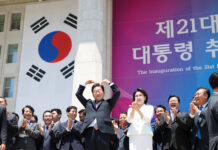
U.K. Secretary of State Boris Johnson (left) and Foreign Minister Yun Byung-se hold bilateral talks in London on Feb. 22 where they discussed measures to strengthen sanctions on North Korea.
Korea and the U.K. have agreed to further strengthen cooperation to counter threats from North Korea.
Foreign Minister Yun Byung-se and U.K. Secretary of State Boris Johnson held bilateral talks in London on Feb. 22 to discuss countermeasures to Pyongyang’s nuclear weapons, as well as the state of affairs in Northeast Asia and Europe, the implications of Brexit and ways to deal with violent extremism.
The two top diplomats reaffirmed that North Korea’s development of nuclear weapons, despite multiple U.N. Security Council (UNSC) resolutions that prohibit such programs, presents a serious threat to the Korean Peninsula, Northeast Asia, Europe and to the world at large. Both leaders strongly condemned Pyongyang’s latest ballistic missile launch on Feb. 12.
“The U.K., a nation central to the UNSC and the European Union (EU), has played a significant role in condemning North Korea’s numerous nuclear weapons tests and enforcing sanctions that put pressure on the Northern regime,” said Minister Yun. “With so little time remaining before North Korea achieves full nuclear armament, it’s crucial that the U.K. lead efforts to make Pyongyang realize there is no other choice than denuclearization.”
Secretary Johnson expressed concern over the accelerated pace of North Korea’s nuclear weapons program. “The U.K. will take complementary measures to fortify the EU’s sanctions against North Korea. Even after Brexit, the U.K. will maintain its steadfast position against Pyongyang’s nuclear weapons and missile programs,” he said.

U.K. Secretary of State Boris Johnson (left) and Foreign Minister Yun Byung-se shake hands before holding bilateral talks in London on Feb. 22.
The diplomats spoke about Korea-U.K. relations, considering their joint efforts in protecting democracy and human rights in Northeast Asia and the greater Asia Pacific region. They also mentioned their cooperation on science and technology, national defense as well as the arts and culture, and agreed to provide more governmental support to further develop each of these areas.
“As democratic countries sharing universal values, it’s important that we join forces to counter influences from unilateral, protectionist states that impinge on our freedoms,” said Secretary Johnson.
Finally, the two countries agreed to expand cooperative channels between their governments, to maintain global peace and to address issues such as violence, piracy, crisis management and economic development.
By Lee Hana
Korea.net Staff Writer
Photos: Ministry of Foreign Affairs
hlee10@korea.kr























